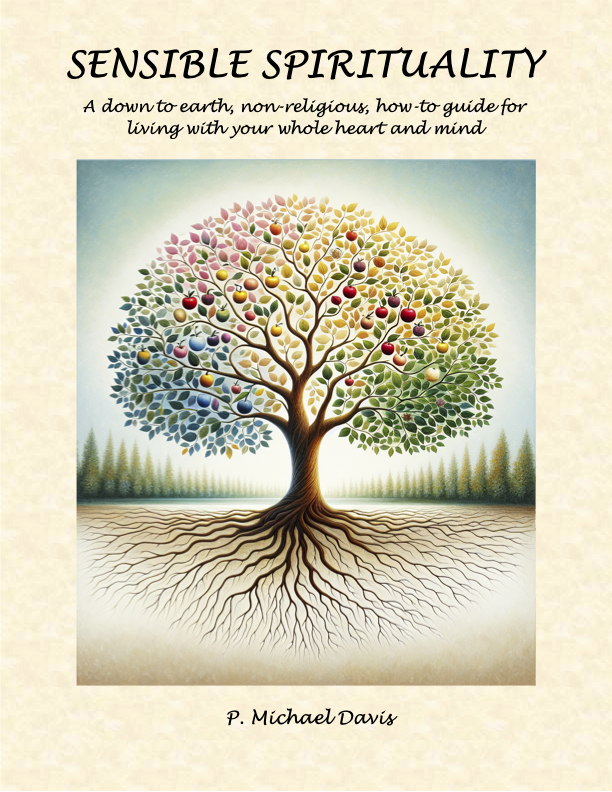Everyday God Relationship

When I am asked about what kind of relationship I have with God, my answer is always that I have an “everyday God” kind of relationship. But there is no right or wrong answer to that question, and over the years, I have come to the conclusion that people have a wide range of different answers:
- I know some who have the “I have no relationship” relationship with God. They try and ignore God, run the universe on their own until that falls apart, and then either despair or desperately try to contact God for help. That kind of relationship is like an old story about a soldier during World War II whose mother, a devoted Christian, gave him a cross to keep him safe in battle. He didn’t really think much of either it or God, but to make her happy he wore it around his neck. During a very heated battle he jumped into a foxhole and next to him was an army chaplain. The young man quickly pulled out the cross, looked at the chaplain and said, “Boy, am I glad to see you. Quick, tell me how to work this thing.”
- There is also the rich aunt or uncle relationship, also known as the Santa Claus relationship, which consists of contacting God as if God was a little known but generous relative, or Santa Claus, who might be willing to contribute to a need or desire that the person might have.
- Then there is the one hour on Sunday, or Friday or whatever day they might set aside for spiritual connection relationship. That kind of relationship is one in which there is a set amount of time on a predetermined day which allows for God to be in relationship with him or her. If the weather is bad or something else comes up, God is just out of luck this week. He or she will just catch up with God next week.
- There is the getting-my-ticket-punched relationship which is the one where a person goes to religious services so that they can be in compliance with the requirements for first-class eternal living accommodations. Any genuine spiritual connection is not required, just showing up and getting their ticket punched is all that is necessary.
I could go on and on, but I think you get my point.
So, what is a genuine everyday God relationship like?
For me, the everyday God relationship is truly just that. It is an everyday, all the time, in my face, in my heart, and in my mind ongoing connection with God. So many people have been taught that God is somewhere way out there in the great beyond, busily doing something very important, and we are down here living our unimportant finite lives. If something concerning us comes up that gets God’s attention, then the Holy One stops doing the infinitely important stuff long enough to connect with us and take care of what came up on our end. In short, it's sort of like the retired parents who moved from Minnesota to Florida. God loves us but is separate from us and becomes difficult to contact.
An everyday God relationship requires a completely different mindset from the separate, hard- to-find-God one. The truth is that we are not separated, and God is not hard to find at all. As I say over and over again, we are created for relationship with God and with each other, and the idea of finding God is ludicrous. God has never been lost and neither are we. We are spiritual beings who are directly connected to God from our beginning. We don’t have to find God because God is all around and within us.
What would help us see that? We somehow have to find a way to give up is the notion that we are separated from God because we are unacceptable, lost and unworthy of a relationship. We are acceptable and we are worthy because we were created and are loved by the Holy Creator, and the Creator wants to have an everyday relationship with us.
Think about t this way: how would you feel about yourself if you found out that somebody really famous, or somebody you greatly admired thought you were just the coolest being ever, and wanted to have a relationship with you? You would feel pretty good about yourself, right?
Well, GOD, who created and sustains the most famous, and most admired beings ever, wants to have a relationship WITH YOU. But, for that relationship to happen, you have to accept yourself, stop trying to find an absent God, and open yourself to the truth of God’s presence, love and desire to be in an everyday relationship with you. If you find accepting yourself difficult, just remember, God thinks you are awesome, so there must be something wonderful about you.
"Be still and know that I am God."

So, how do we do that, especially after many of us have been taught that we are terrible lost sinners, God is angry with us, and going to eternally punish us for all that we have done wrong in life? There are two pieces of writing, one from the Jewish scriptures and the other from the Christian scriptures that I think might be helpful in understanding how to go about this change of mindset.
Psalms - Chapter 46 verse 10
"Be still and know that I am God."
- Being still is difficult for most of us. This is easy to understand when you look at how our brains function. Check out these simple facts:
- information travels through the human brain by means of neurons and there are about 100 billions of them in your brain. This is roughly the same number of neurons as the number of stars in our galaxy.
- the slowest speed that information travels between neurons is about 260 mph.
- the energy used by the brain at all times is at least enough to light a 25-watt bulb.
- the average number of thoughts that humans are believed to experience each day is a minimum of 70,000.
Our brains are incredibly busy and active whether we are asleep or awake, which makes the whole concept of just “being still” neither natural nor easy. Then why is the writer of this psalm telling us that the unnatural idea of “being still” is the way to know God?
Part of it is a language barrier. When “be still” is translated from Hebrew into English, the Hebrew phrase literally means to “release control; let go of your preconceptions; relax.” Being still means calming our thoughts and being open to the here-and-now presence and love of God. Being still allows us to simply experience God’s love and presence without any of the theological preconceptions, irrational fears, negative self-images, or emotional baggage we tend to be carrying from our childhood, adolescence and/or our “religious” training.
It sounds simple, right? Just sit and be still. So, here I am, ready to experience God’s presence and my mind is everywhere except here. I'm thinking about how long it is going to take for me to write this section, how good my lunch was, and my mind is just flitting from one subject of thought to another. God is here – but I am not here, and the great reality is that God is always here, but only in the right here and now. The living presence of God doesn’t show up in the past or in the future. We can’t book an appointment with it. We experience God only in the now, but we miss the opportunity because we tend to live in the past or in the future, and we want to analyze rather than experience being still right now.
Why is it so difficult?
Why does this seem to be the case? I have a theory, but it is not that our brains are too active to “be still.” Rather, I am convinced it’s because mentally and emotionally, showing up for an intimate relationship can start at uncomfortable and move to terrifying. Being present and intimate means being emotionally and spirituality open and vulnerable.
Even though we can intellectually reason that a relationship with God will be the safest and most accepting of them all, we frankly just don’t know God well enough to “take that to the bank.” And, in our heart-of-hearts we know that while relationship with God will be loving, it will also be honest. We will be encouraged to take an honest look at ourselves and the things in our life that are not so pleasant. The good news is that while that may be uncomfortable, it will also be a positive growth experience.
The bottom line is that being still and allowing ourselves to be present with God in the here-and-now is possible, and it is worth the effort. But how do we get there?
- On my Spiritual Development page I talked about studying Zen Buddhism and practicing meditation. That process still seems to work best for me, but it is certainly not the best for everyone because there can be a long learning curve.
- Another way is to practice mindfulness. Mindfulness has become a well-accepted and effective way to calm the busyness of our minds and help us focus in the moment so that we can be available to experience God’s presence. There are books and even apps for mindfulness training.
- In addition, a simple repetitive breath prayer can be helpful. Or meditating on a passage of spiritual reading can help put our minds at rest.
It really doesn’t matter what activity we choose. The goal is to quiet our mind so we can be present in the here and now with God.
Be still and know that I am God.
If you remember before my long treatise on being still, I said there were two pieces of writing that I thought might be helpful in changing our mindset about an everyday relationship with God. The second one, from the Christian scriptures, was written by the Apostle Paul in his letter to the Romans.
Paul’s Letter to the Romans – Chapter 12 verse 2
"Don’t be like the people of this world, but let God change the way you think. Then you will know how to do everything that is good and pleasing to God."
“Let God change the way you think.” God’s very nature is love and truth. Therefore, if we allow God to change the way we think and what we believe, then we will know how to enter the kind of relationship God wants and we actually want as well. But how do we let God change the way we think and what we believe?
In order to adequately answer that question, I am going to ask you to go to my page Real God Relationship which discusses how we tend to get caught in negative and destructive patterns of thinking that block us from experiencing God’s presence, how to overcome those patterns, and how to open our minds and spirits to God’s transforming guidance.
Sensible Spirituality
A down to earth, non-religious, how-to-guide for living with your whole heart and mind
While there are a multitude of books about personal development and spiritual growth, author and storyteller P. Michael Davis goes down a different path by offering a real-life conversation about how to build and maintain a positive and spiritually healthy life.
His approach is thoroughly non-religious, entertaining, and devoid of jaw clenching seriousness. He will walk you through the whys and how tos of spiritual awareness, spiritual relationship building, spiritual love, and spiritual parenting for children and adolescents.
Sensible Spirituality is available, by clicking the book cover above, in kindle, paperback, and audio book formats at Amazon.com.

